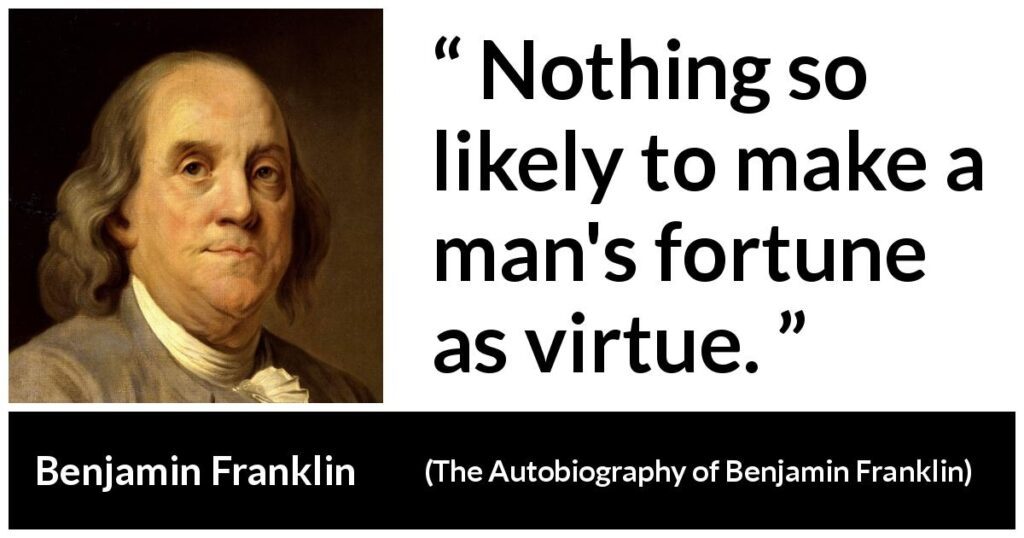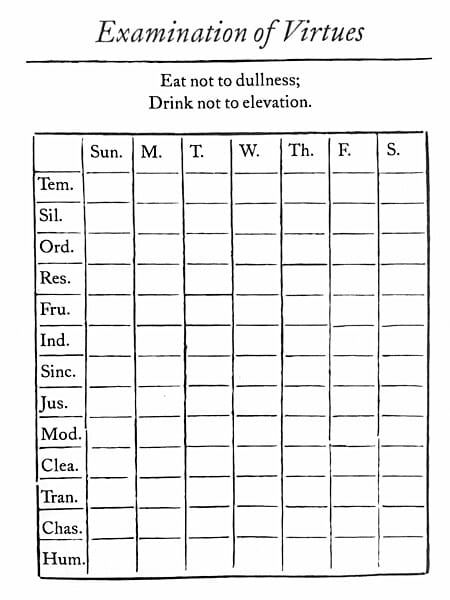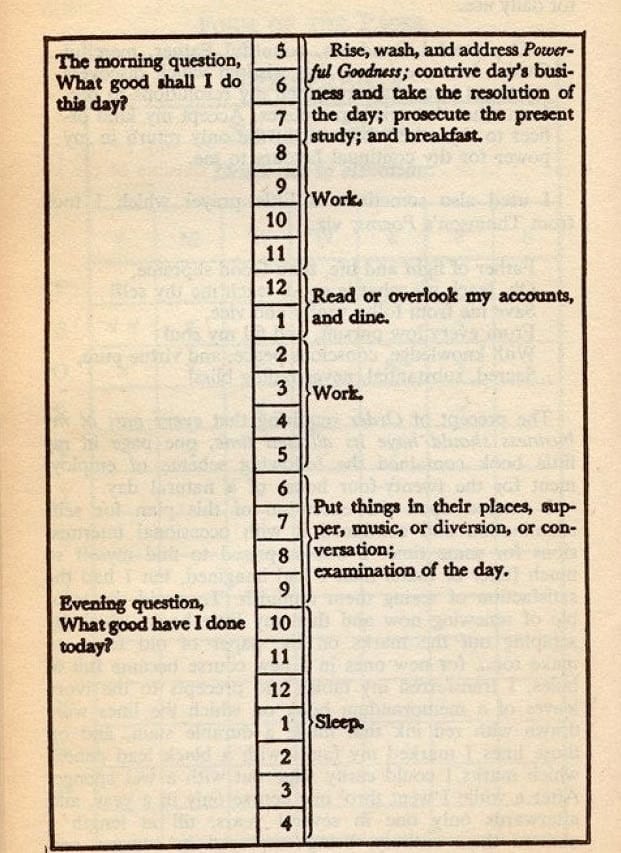The Philosophy of Benjamin Franklin: A Timeless Guide to Personal Growth
It is a truth I have found, through both reading and reflection, that the person who seeks to improve their character must do so by steady effort—not by sudden leaps of will, nor by bursts of inspiration. Improvement is quiet. It is patient. And few have illustrated this better than Benjamin Franklin.
Franklin, a printer turned statesman, scientist, and inventor, once set for himself a bold task: “I conceived the bold and arduous project of arriving at moral perfection.” He did not, by his own admission, succeed in becoming perfect—but his method, his system of self-mastery, remains one of the most practical and timeless blueprints for personal growth.
This piece is not to glorify Franklin the man, but to lift up Franklin the method—because in the method, there is something deeply useful for all of us.
Begin With Your Own Virtues
Franklin believed character could be shaped, not just hoped for. So he began by creating a personal list of thirteen virtues—qualities he believed essential for living a useful, honorable, and contented life. He chose them not from scripture or philosophers, but from experience.
Here is his list:
- Temperance – Eat not to dullness. Drink not to elevation.
- Silence – Speak not but what may benefit others or yourself. Avoid trifling conversation.
- Order – Let all your things have their places. Let each part of your business have its time.
- Resolution – Resolve to perform what you ought; perform without fail what you resolve.
- Frugality – Make no expense but to do good to others or yourself; i.e., waste nothing.
- Industry – Lose no time. Be always employed in something useful.
- Sincerity – Use no hurtful deceit. Think innocently and justly.
- Justice – Wrong none by doing injuries or omitting the benefits that are your duty.
- Moderation – Avoid extremes. Forbear resenting injuries so much as you think they deserve.
- Cleanliness – Tolerate no uncleanliness in body, clothes, or habitation.
- Tranquillity – Be not disturbed at trifles or accidents common or unavoidable.
- Chastity – Rarely use venery but for health or offspring.
- Humility – Imitate Jesus and Socrates.

These were not meant to decorate a wall or be memorized like a schoolboy’s creed. They were meant to be lived.
If you are to follow his path, begin by making your own list. You may borrow some of Franklin’s, or replace them with virtues that speak to your own struggles and aspirations. Keep the list short. Thirteen is more than enough.
The Habit Tracker: A Simple Table for a Complex Task
Franklin knew that good intentions alone wouldn’t change his behavior. So he designed a tracking system: a small book with a table. The days of the week ran across the top. The virtues listed down the side. Each time he failed in a virtue, he placed a small black mark in that box.
Here’s the brilliance: the goal wasn’t to avoid marks entirely, but to see them. To become aware. “I was surprised to find myself so much fuller of faults than I had imagined,” he admitted.
Today, you don’t need a handmade chart. You can use a bullet journal, a digital habit tracker, or even a spreadsheet. What matters is that you look. You face the data. You reflect honestly.

![]()
One Virtue at a Time: Focus, Not Frenzy
Trying to be excellent in thirteen things all at once is a fast path to burnout. Franklin knew this. So he dedicated one week to each virtue, cycling through them over 13 weeks, four times a year.
“My intention being to acquire the habitude of all these virtues,” he wrote, “I judged it would be well not to distract my attention by attempting the whole at once.”
Follow that wisdom. Choose one virtue each week. Let it guide your choices, your tone, your reactions. Carry it like a quiet companion. And when the week ends, move on to the next.
Franklin’s Daily Routine: A Life by Design
To support his virtue practice, Franklin kept a disciplined daily schedule—one that combined work, reflection, and rest in equal measure. It looked something like this:
Morning (5–8 AM):
- Rise, wash, and address the morning question: What good shall I do this day?
- Review the day’s virtue
- Eat breakfast, plan the day, and work on self-improvement
Work (8–12 PM):
- Focused labor in his printing business
Midday (12–1 PM):
- Eat lunch, read, and reflect
Work (2–5 PM):
- More business, with attention to industry and order
Evening (6–9 PM):
- Put things in their place, review the virtue journal
- Answer the evening question: What good have I done today?
- Wind down and prepare for rest
Franklin didn’t always follow this schedule perfectly. But it gave his life shape—a rhythm that kept him anchored in intention.

Reflection, Not Reproach
At week’s end, Franklin would sit with his marked chart. He did not berate himself. He did not despair. He studied. He adjusted. “I had the satisfaction of seeing them diminish,” he wrote of his faults.
Treat yourself the same way. This is not a system for punishing yourself. It is a mirror. Look into it gently. Improvement flows not from shame, but from curiosity.
Each evening, jot down one thing you did well. One thing you could improve. One small step to try tomorrow.
The Goal Is Not Perfection, But Progress
Franklin, for all his ambition, remained humble. He knew he would never be flawless. But he also knew that effort, sustained over time, changes a person.
“Tho’ I never arrived at the perfection I had been so ambitious of obtaining,” he wrote, “I was, by the endeavor, a better and a happier man.”
That is the point. Not sainthood. Not spotless days. Just the quiet satisfaction of knowing you are trying. Day by day. Week by week.
How You Can Start Today
This method, though born in the 18th century, fits modern life remarkably well. Here’s how you might begin:
- Make your own list of virtues. Define them simply. Aim for 10–13.
- Track daily. Use a journal, app, or notebook. Mark your faults honestly.
- Focus weekly. Choose one virtue to emphasize. Carry it with you.
- Reflect nightly. Write one thing you improved and one thing you learned.
- Be patient. Character is carved slowly, not sculpted in a day.
This system is not glamorous. It won’t go viral. It won’t give you six-pack abs or make you rich in 30 days.
But it will give you something more enduring: self-respect. Clarity. A quiet strength that holds fast when life grows chaotic.
So take one virtue. One week. And begin.
As Franklin reminds us:
“Without continual growth and progress, such words as improvement, achievement, and success have no meaning.”



